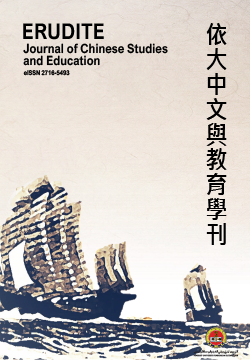西学视界下的旧学: 论钱锺书“以故为新”的文学史观
The Tradition Studies Under Western Perspective: Ch’ien Chung-Shu’s Ideology of Literary History on “Take the old as the New”
DOI:
https://doi.org/10.37134/erudite.vol2.2.4.2021Keywords:
后五四, 钱锺书, 吴宓, 学衡派, 书评Abstract
作为后五四时期的文人学者,钱锺书不仅有深厚的家学根底,也经历过西洋文学的专业打磨,使其文学视野相当开阔,对东海及西海的新旧学皆不陌生。同样站在中西学的比较立场,五四时期的学者为了塑造新文学的合法性,往往侧重于译介异邦中的“新声”,策略性放大西学优点及旧学缺陷。反之,学衡派倾向于从西洋古典文学中吸收养分,并将传统的国学研究放置在西学视界下观照。遗憾的是,学衡派在新文学运动中被视为反动者,他们的研究思路在新旧学的紧张对峙下被遮蔽。1932-1935年间,钱锺书作为清华大学外文系毕业生及上海光华大学的年轻讲师,在《清华周刊》、《新月》月刊、《大公报·文艺副刊》、《国风》半月刊、《天下评论》等刊物上,发表了系列的中英文书评及论文。在早年的评论文章中,钱锺书评价宋代文论及诗赋时,借用宋调“以故为新”的文论,探讨如何突破文学势力圈的笼罩。此外,他的英文论文不仅与海外汉学家对话,也在学衡派将旧学纳入西学视界的基础上继续前进,强调唯有在中海与西海及新旧学的会通中,才能将古代文学适当地安置在文学史与艺术殿堂中。
As a Post-May Fourth scholar, Ch’ien Chung-Shu had gained a deep foundation for tradition studies from home, as well as underwent professional training on Western Literature. Thus, his literary perspective was much wider, familiar with the tradition and modern studies within Eastern and Western world. While comparing the Chinese and Western studies, the May Fourth scholars tended to promote “new voices” from the foreign land, taking strategic of enlarged the advances of Western studies plus highlighted the defect of Chinese studies, in order to shape the legality of New Literature. On the contrary, the Xueheng School (学衡派) tended to absorb new nutrients from the Western Classical Literature, even analyzed the Chinese tradition studies from Western perspective. Regrettably, the Xueheng School was considered as the opposition during the New Literature Movement, their approach usually obscured by the tense confrontation between the new and tradition studies. Between 1932-35, Ch’ien Chung-Shu graduated from the Department of Foreign Languages, Tsinghua University, then became a young lecturer in Shanghai Guanghua University. He had published a series of Chinese and English book reviews, including papers in Tsinghua Weekly, Crescent Monthly, Ta Kung Pao, Guofeng Bimonthly, T’ien Hsia Monthly publications. In early review articles, when Ch’ien Chung-Shu analyzed the Song Dynasty literary theory and poetry, he borrowed the ideology of “take the old as the new”, discussed about the breakthrough of the literary power circle. His English papers not only formed dialogue with the overseas sinologists, but also moved forward from the foundation of Xueheng School, which included the tradition studies within Western vision. He mentioned that through the meetings of the tradition and modern studies within Eastern and Western world, we could place the Classics in the literary history and the art palace.
Keywords: Post-May Fourth, Ch’ien Chung-Shu, Wu Mi, Xueheng School, book review
Downloads
References
【征引文献】
一、中文著作
吴宓著、王岷源译,《文学与人生》,北京:清华大学出版社,1993。
吴宓著、吴学昭整理,《吴宓诗话》,北京:商务印书馆,2005。
胡志德著、张晨等译,《钱锺书》,北京:中国广播电视出版社,1990。
张丽华,《现代中国“短篇小说”的兴起》,北京:北京大学出版社,2011。
钱锺书,《宋诗选注·苏轼》(1958年),北京:人民文学出版社,1997。
______,《谈艺录:补订重排本(上)》(1948年),北京:生活·读书·新知三联书店,2001。
爱默,《钱锺书传稿》,天津:百花文艺出版社,1992。
龚刚,《钱锺书爱智者的逍遥》,北京:文津出版社,2004。
二、期刊论文、文章
中书君(钱锺书),〈(评)中国新文学的源流〉,《新月》月刊第4卷第4期(1932年)。
_____,〈(评)近代散文钞(两卷)〉,《新月》月刊第4卷第7期(1933年)。
_____,〈中书君诗〉,《国风》半月刊第6卷第3、4合期(1935年)。
_____,〈论复古〉,《大公报·文艺副刊》第111期(1934年10月17日)。
龚刚,〈浅析钱锺书对苏东坡赋的英文评论〉,《中国比较文学》第3期(2010)。
三、英文文献
钱锺书,《钱锺书英文文集》,北京:外语教学与研究出版社,2005。
______, Book Note II, Tsinghua Weekly 《清华周刊》XXXVI (1932)
______, On‘Old’Chinese Poetry, The Chinese Critic 《中国评论周报》VI(1933)
______, Foreword to the Prose-poetry of Su Tung-P’o(1935)
______, Tragedy in Old Chinese Drama, from T’ien Hsia Monthly 《天下月刊》I(1935)
______, Correspondence: To the Editor-in Chief of T’ien Hsia,T’ien Hsia Monthly (《天下月刊》)IV(1937)





